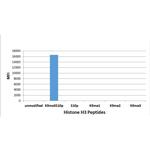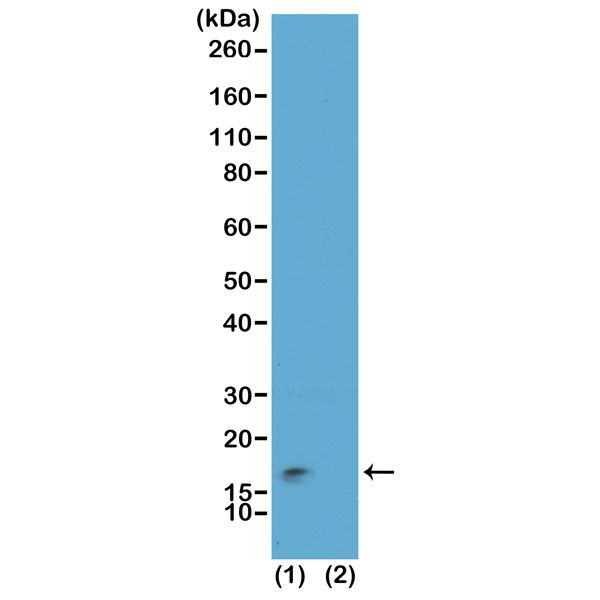Search Thermo Fisher Scientific
Invitrogen
H3K9me3S10ph Recombinant Rabbit Monoclonal Antibody (RM162)
FIGURE: 1 / 2
H3K9me3S10ph Antibody (MA5-33083) in WB


Product Details
MA5-33083
Species Reactivity
Host/Isotype
Expression System
Class
Type
Clone
Immunogen
Conjugate
Form
Concentration
Purification
Storage buffer
Contains
Storage conditions
Shipping conditions
RRID
Product Specific Information
Specificity: reacts to Histone H3 only when modified AT both trimethyl lysine 9 and phospho serine 10 (K9me3/S10p).
Recombinant rabbit monoclonal antibodies are produced using in vitro expression systems. The expression systems are developed by cloning in the specific antibody DNA sequences from immunoreactive rabbits. Then, individual clones are screened to select the best candidates for production. The advantages of using recombinant rabbit monoclonal antibodies include: better specificity and sensitivity, lot-to-lot consistency, animal origin-free formulations, and broader immunoreactivity to diverse targets due to larger rabbit immune repertoire.
Target Information
Histone H3 is one of the DNA-binding proteins found in the chromatin of all eukaryotic cells. H3 along with four core histone proteins binds to DNA forming the structure of the nucleosome. Histones play a central role in transcription regulation, DNA repair, DNA replication and chromosomal stability. Post translationally, histones are modified in a variety of ways to either directly change the chromatin structure or allow for the binding of specific transcription factors. The N-terminal tail of histone H3 protrudes from the globular nucleosome core and can undergo several different types of post-translational modification that influence cellular processes. These modifications include the covalent attachment of methyl or acetyl groups to lysine and arginine amino acids and the phosphorylation of serine or threonine.
For Research Use Only. Not for use in diagnostic procedures. Not for resale without express authorization.
References (0)
Bioinformatics
Protein Aliases: H3 histone family, member A; H3 histone family, member I; H3 histone family, member J; H3 histone family, member K; H3 histone family, member L; H3 histone family, member M; H3 histone, family 2; H3 K9; H3 K9me3; H3 S10; H3 S10ph; H3-clustered histone 13; H3-clustered histone 14; H3-clustered histone 15; H3-clustered histone 2; H3-clustered histone 3; H3-clustered histone 4; H3-clustered histone 6; H3-clustered histone 7; H3/b; H3/d; H3/f; H3/j; H3K9; H3K9me3; H3K9me3S10p; H3K9trS28p; H3K9trS28ph; H3Lys9me3Ser10p; H3Lys9me3Ser10ph; H3Lys9trSer28p; H3Lys9trSer28ph; H3s10; H3S10ph; histone 1, H2ai; histone 1, H3a; histone 1, H3b; histone 1, H3f; histone 1, H3h; histone 1, H3j; histone 2, H3a; histone 2, H3c; histone 2, H3c2; histone 2, H3ca2; Histone 3; histone cluster 1, H2ai; histone cluster 1, H2ai-like; histone cluster 2, H3c2, pseudogene; histone gene complex 1; histone H3; Histone H3 K9; Histone H3 K9me3; Histone H3 S10; Histone H3 S10ph; Histone H3.1; Histone H3.2; Histone H3/a; Histone H3/b; Histone H3/c; Histone H3/d; Histone H3/f; Histone H3/h; Histone H3/i; Histone H3/j; Histone H3/k; Histone H3/l; Histone H3/m; Histone H3/o; Histone H3K9; Histone H3K9me3; Histone H3K9me3S10ph; Histone H3S10; Histone H3S10ph; methyl Histone 3; methyl Histone H3; phospho Histone 3; phospho Histone H3; Phospho-Tri-Methyl-H3 K9 S10; Phospho-Tri-Methyl-H3 Lys9 Ser10; Phospho-Tri-Methyl-Histone H3 K9 S10; Phospho-Tri-Methyl-Histone H3 Lys9 Ser10; Phospho-Tri-Methyl-Histone H3 S10 K9; Phospho-Tri-Methyl-Histone H3 S28 K27; Phospho-Tri-Methyl-Histone H3 Ser10 Lys9; Phospho-Tri-Methyl-Histone H3 Ser28 Lys27; Tri-methyl H3; Tri-methyl Histone H3; Trimethyl H3; Trimethyl Histone H3
Gene Aliases: H3; H3 histone; H3-143; H3-291; H3-53; H3-614; H3-B; H3-F; H3.1-221; H3.1-291; H3.1-I; H3.2; H3.2-221; H3.2-614; H3.2-615; H3.2-616; H3/A; H3/i; H3/j; H3/k; H3/l; H3/M; H3/n; H3/o; H3a; H3b; H3C1; H3C10; H3C11; H3C12; H3C13; H3C14; H3C15; H3C2; H3C3; H3C4; H3C6; H3C7; H3C8; H3f; H3F1K; H3F2; H3FA; H3FB; H3FC HIST1H3C; H3FD; H3FF; H3FH; H3FI; H3FJ; H3FK; H3FL; H3FM; H3FN; H3g; H3h; H3i; Hist1; Hist1h2ai; Hist1h2ail; HIST1H3A; HIST1H3B; Hist1h3c; HIST1H3D; HIST1H3E; HIST1H3F; HIST1H3G; HIST1H3H; HIST1H3I; HIST1H3J; HIST2H3A; Hist2h3b; HIST2H3C; Hist2h3c1; Hist2h3c2; Hist2h3c2-ps; Hist2h3ca1; Hist2h3ca2; HIST2H3D; M32461
UniProt ID: (Human) P68431, (Human) Q71DI3, (Rat) Q6LED0, (Mouse) P68433, (Mouse) P84228, (Mouse) Q8CGN9

Performance Guarantee
If an Invitrogen™ antibody doesn't perform as described on our website or datasheet,we'll replace the product at no cost to you, or provide you with a credit for a future purchase.*
Learn more
We're here to help
Get expert recommendations for common problems or connect directly with an on staff expert for technical assistance related to applications, equipment and general product use.
Contact tech support
